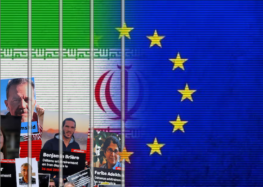Government Committee To Review Satellite Jamming Signals’ Effects on Public Health
Iran’s Minister of Health and Medical Education said yesterday that a committee has been formed to review the the health effects of satellite jamming signals on the Iranian people’s health, following a request from President Rouhani. In an exclusive interview with IRNAon February 4 in Tehran, Dr. Seyed Hassan Ghazizadeh Hashemi said, “This team is comprised of experts from the Ministries of Communications and Health, the Nuclear Energy Organization, and other related organizations, and they are conducting their review in full freedom. If there are any problems in this area, they will announce that.”
“We have been insisting for the past three months that further reviews must be carried out, to clarify if there are any problems. Initial reports indicate that the existing signals do not cause physical problems for people, but this committee’s research must be completed,” said the Health Minister. “The committee will conduct measurements in different areas of the city, or wherever there are jammed signals,” he added, but did not explain what methodology or technology will be used for the measurements.
“There are a lot of rumors about the jamming signals and their effect on the people’s health, but I can say based scientific evidence that many of the rumors have almost no scientific merit,” said Ghazizadeh Hashemi. “Claims about a series of illnesses caused by the jamming signals, or effects such as miscarriages, are not things that have a scientific basis,” said the Health Minister, stating that his Ministry’s “responsibility in the Committee is to review protections of people’s health.” He did not immediately make clear under which organization the Committee operates.
Over the past 3.5 decades, the Iranian government has consistently generated jamming signals to prevent broadcasts of foreign-based opposition radio programs and news into Iran. In recent years they have extended this to include the transmission of satellite jamming signals. The Iranian government has invested massive financial and human resources into raiding homes and destroying and breaking satellite television receivers and dishes and preventing broadcasts of satellite television programs from reaching Iranian audiences. The effort intensified after the disputed 2009 presidential election that ended in public protests which were brutally suppressed. After graphic images of the government brutality on the unarmed protesters were shared on social media such as YouTube, Facebook, and Twitter, the Iranian government engaged in a variety of ways to slow down and block Internet services in Iran, ban news reports about the developments, and to ultimately attempt to jam foreign news signals from reaching Iran.
The Health Minister’s statement about the safety of the satellite signals, even before his referenced committee has conducted its investigation or announced its findings, is cause for concern among activists who have been requesting just such an investigation into the ill effects of the practice.
There has been a lot of talk about the adverse effects of the satellite jamming signals in Iran. Though the jamming activities have been confirmed, and even the location for the transmissions have been known, it has never been revealed which specific government entity is responsible for transmitting the jamming signals. Massoumeh Ebtekar, the former Head of Tehran City Council’s Environment Commission who is currently a Vice President and Head of Environmental Protection Organization, has repeatedly expressed concern about the effects of the jamming signals on citizens’ health. There are reports that the waves used to jam signals are physically harmful to humans. Some reports allege that the rates of cancer and infertility may be higher in regions where there are satellite jamming devices. “As an immunologist and researcher, I can say that these signals can be the source of many complications and illnesses,” Ebtekar said in May 2013, as reported by Khabar Online. This is the first official investigations into the health effects of satellite jamming.
In the August 2013 report, “Fulfilling Promises, A Human Rights Roadmap for Iran’s New President,” under the section pertaining to Ministry of Communications and Information Technology, the International Campaign for Human Rights in Iran asked Hassan Rouhani to end transmission of satellite jamming signals in Iran.







